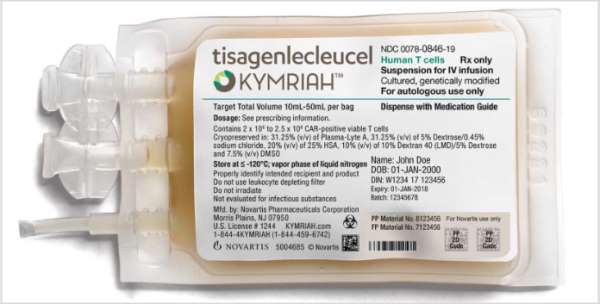Novartis files CAR-T in Europe in broader use than Gilead rival

Novartis has filed its CAR-T therapy, Kymriah, in Europe in a broader use than its close rival from Gilead.
The Swiss pharma filed Kymriah in the EU for children and adults with relapsed or refractory (r/r) acute lymphoblastic leukaemia and adults with r/r diffuse large B-cell lymphoma (DLBCL) who are ineligible for autologous stem cell transplant.
This effectively combines the two separate filings Novartis made in the US, although the DLBCL indication is for a much larger cohort of patients.
Gilead and newly purchased subsidiary Kite got a European filing in first at the end of July – but they are only chasing a use in a DLBCL, a form of non-Hodgkin’s lymphoma.
Both CAR-Ts are already approved in the US and are expected to generate several billion dollars in sales at their peaks. The cost of the drugs are likely to come under even greater pressure than in the US, where Kymriah (tisagenlecleucel) costs $475,000 per patient, although Novartis offers a rebate if it does not work.
Gilead’s therapy undercuts Novartis’ drug at $373,000 per patient, but does not offer a rebate.
Chimeric antigen receptor T-cell (CAR-T) therapies are one-off treatments that involve harvesting a patient’s T-cells, and genetically reprogramming them to fight cancer.
Trial data so far show they offer a complete response – a complete absence of disease - in some patients for up to several years, although if and when these patients might relapse in the long term is not yet known.
Side effects of the drug can be fearsome and must be carefully managed as the immune system goes into overdrive.
UK biotech Oxford BioMedica is also closely involved with the Novartis drug – following a deal in July it is sole manufacturer of the lentiviral vectors used to modify the T-cells once harvested.
Without giving further details, the company noted it could receive more than $100m from Novartis over the next three years.
It will also receive undisclosed royalties from future sales of Novartis CAR-T products under an earlier deal signed in 2014.
Novartis’ filing is based on the Novartis-sponsored global, multicentre, phase 2 ELIANA and JULIET trials, which were conducted in collaboration with the University of Pennsylvania, where the therapy was first developed.
ELIANA is the first paediatric global CAR-T cell therapy registration trial, examining patients in 25 centers in the US, Canada, Australia, Japan and the EU, including: Austria, Belgium, France, Germany, Italy Norway, and Spain.
JULIET is the first multi-centre global registration study for CTL019 in adult patients with r/r DLBCL. JULIET is the largest study examining a CAR-T therapy exclusively in DLBCL, enrolling patients from 27 sites in 10 countries across the US, Canada, Australia, Japan and Europe, including: Austria, France, Germany, Italy, Norway and the Netherlands.
Data from the six-month primary analysis of JULIET will be presented at the annual meeting of the American Society of Hematology (ASH) next month.
Novartis plans additional regulatory submissions for Kymriah in paediatric and young adult patients with r/r B-cell ALL and adult patients with r/r DLBCL outside the US and EU in 2018.
Barak Palatchi, Oncology General Manager, Novartis UK & Ireland, said: “There is an urgent need for innovative treatments for children and young adult patients with these aggressive diseases, who don’t respond to, or have multiple relapses after receiving traditional therapies.
"Building on our US experience, where we launched the first ever CAR-T therapy, we are working hard to help bring this game-changing therapy to those eligible patients with limited treatment options.”











